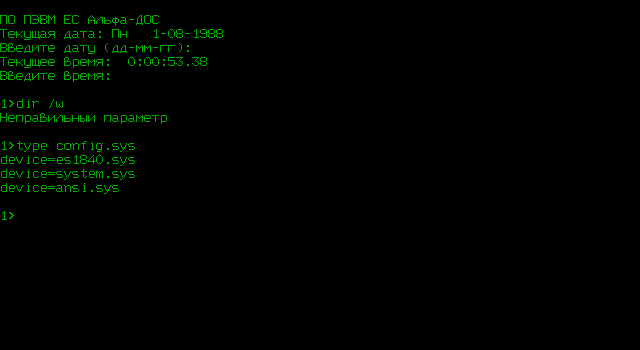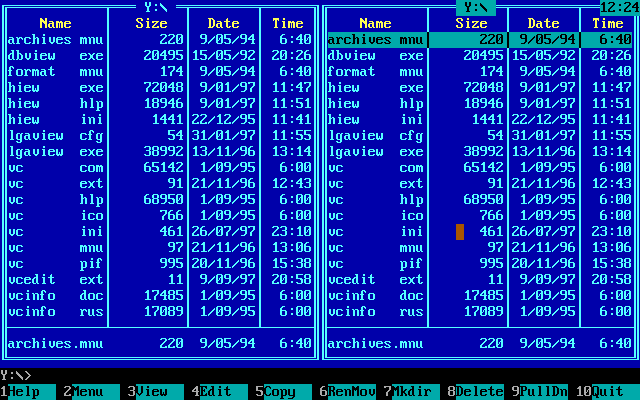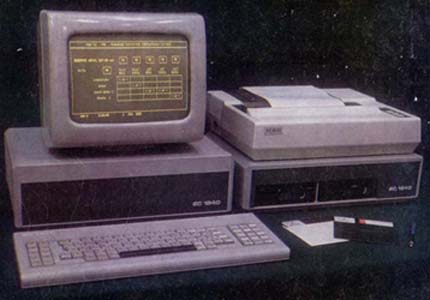Most of it relies on several assumptions, which weren't covered by Drew:
- ZX Spectrum - Drew mentioned Sinclair's tricycle here, so his company does exist. My assumption is that he released the Spectrum several years later than in OTL, and it would also be bought by Amstrad, like in OTL
- Motorola processors like 68000 aren't widespread or simply don't exist.
- IBM PC was also sold in Western Europe and Canada, but didn't quite take off there, and the revelation of TRW's spying on user activities wiped out its popularity there. Because of TRW and its software restrictions, IBM PC did not become a template for other PCs in Western Europe like in OTL. Ironically, it would be one in TTL USSR.
- CoCom broke down along with NATO in 1983-1984, and Soviet Union could eventually acquire advanced production tech from Western countries.
- UNIX exists in TTL.
Also:
- Soviet leadership eventually warmed up to the use of PCs at the workplace - in the 1990s, they are often used in accounting and other office work, replacing mechanical calculating machines and typewriters where it's possible. However, they aren't widespread outside the well-off parts of the Soviet Union like European part of Russia, Ukraine, Belarus, the Baltic republics and Georgia.
- Soviet industry could successfully modernize after the end of CoCom, resulting in a rise in manufacturing quality by early-mid 1990s. Then again, a good part of their success is probably because the rest of the world is in a pretty awful state. Also, I assume the USSR is comparatively well-off in mid-1990s.
PK-DOS
ПК-ДОС (PK-DOS, PC-DOS) is a Soviet disk operating system, designed for the so-called “IBM-derivative” family of personal computers mostly used in the USSR and Eastern Europe. It's a heavily modified offshoot of IBM and TRW's TRI-DOS operating system.
Its creation was a result of Soviet attempts to reverse-engineer the IBM PC in the early 1980s. The Soviets took note of the development of PCs in America and Western Europe, and although officials were highly sceptical about their usefulness in Soviet conditions, they decided to maintain technological parity. IBM was chosen because Soviet intelligence could retrieve the new computer easily; furthermore, Soviet industry already had experience of reverse-engineering IBM products – the ES EVM series of mainframe computers were based off IBM’s System/360.
In 1982, KGB First Chief Directorate’s Line X procured several IBM PCs with TRI-DOS operating system. Although its processor, the 8088, and several other elements of the hardware were easily copied, TRI-DOS proved to be a tough nut to crack for Soviet engineers, due to TRW’s anti-tamper mechanisms designed to hamper modification of the OS. In early 1983, Soviet programmers made a very disturbing discovery in TRI-DOS’ code – a backdoor allowing easy access to the user files and logging mechanisms recording user’s activities. KGB was alarmed, suspecting someone tipped off the American counter-intelligence and that CIA bugged the OS, expecting the Soviets to use it. The first “IBM PC-compatible” machines had a simple BASIC assembler instead of an actual OS.
PK-DOS was developed by NII EVM (Scientific Research Institute of Electronic Computing Machines), based in Minsk, Belarusian SSR. Intended to have the functionality of TRI-DOS, but without its spying mechanisms and limitations, it significantly differed from TRW’s design, as Soviet programmers had to go around numerous corporate restrictions integrated in the original code. Due to complexity of the code, implementing both parts of original design and Soviet code, early versions of the OS had plenty of bugs – it would take several years to fix them. Furthermore, despite similarities like the almost identical file system and file extensions, many programs written for TRI-DOS could not run on PK-DOS without being ported, and vice versa, thus creating the term "IBM-derivative".
PK-DOS 1.0 was released in late 1985 along with ES PEVM 1840 personal computers - both were notorious for their technical issues. Just like TRI-DOS, early PK-DOS could only work on specific hardware configurations of ES PEVM. NII EVM would fix many critical flaws in 1986; however many users preferred to use third-party modifications like Alpha-DOS. A mean-spirited Soviet programmer joke from 1987 claimed that when an IBM programmer loudly complained about how nothing could be worse than living in the rapidly disintegrating US, the devil appeared before him and said he could prove him wrong. “Whatever, anything is better than this!” – the programmer replied. Shortly afterwards, he found himself transported to the Soviet Union and was forced to fix PK-DOS for the rest of his life.
Version 2.0, released in 1988, had very few shortcomings of the previous versions and was quite stable, resulting in more jokes about imprisoned American programmers. In 1992, the so-called ‘international’ version 3.0 was rolled out, featuring English, German, French, Italian, Spanish and other localizations – it was shipped with some Soviet computers exported into Western Europe. The export version was branded “Elektronika PC-DOS”.
Even though a significant number of users used PK-DOS in the early 1990s, its reputation as “unreliable” stuck among many people in the USSR and Eastern Europe. In Western Europe and Canada, it wasn’t used by many due to the stigma of being related to TRI-DOS, besides a group of enthusiasts, who nicknamed it “Russian DOS” and “DOSki”. Soviet state organizations and the military also did not trust the system, and it wasn’t used in state institutions working with sensitive data.
Alpha-DOS, a modification of PK-DOS, running on an ES PEVM computer (modern emulation)
Volkov Commander, a typical PK-DOS file manager
TRW vs. USSR:
American intelligence found out about Soviet acquisition of IBM PC by complete accident. One day in 1983, analysis of recent Soviet media publications by the CIA produced an interesting find – a report about electronics production in Belarusian SSR, broadcast in the evening news program Vremya, contained images of an IBM PC-like computer, running what appeared to be a heavily modified TRI-DOS. TRW touted their facilities and systems as being fully secure, and the find was completely unexpected.
TRW made a very big fuss about the Soviets copying their operating system, demanding Rumsfeld to tighten up information security. They made a press release, calling for stricter measures against Soviet industrial espionage. An anecdote claims that TRW even tried to sue PK-DOS’ developers, mailing summons papers into the USSR. After a while, a reply came to their headquarters, full of various insults of their code, followed by an informative pointer about the place they should shove their patent claims into.
The White House would later on use fears of Soviet espionage, driven up by loyal mass media, as a justification for putting computer networks under government control. IBM would even claim that Soviet spies were planting malware into the computers of ordinary users, and only frequent check-ups by certified IBM and TRW technicians could prevent it.
“Soviet viruses? In my computer?
It’s more likely than you think.
Protect yourself and your data against Communist plots with our maintenance service"
IBM ad, 1984
There are credible evidence that the 1985 anonymous leak of technical information about the inner workings of TRI-DOS, its backdoor and spying mechanisms, which led to a big scandal significantly tarnishing the reputation of IBM and TRW in Western Europe, Canada and Japan, and the ban on IBM PC sales in several European countries, was organized by the Soviets. Most of the information provided in these papers could only be obtained through thorough disassembling and reverse-engineering of the operating system – something that only the creators of PK-DOS could have done.
Personal computers:
ES PEVM 1840, one of the first Soviet IBM-derivative PCs
The first IBM-derivative ES PEVM computers (named to maintain contingency with ES EVM mainframes, also based off IBM’s work) looked cutting edge by Soviet standards, but were hampered by poor manufacturing quality and technical flaws, as Soviet engineers had to create their own hardware and software and use them with IBM-derived ones. Furthermore, Soviet industry had troubles producing many parts for the new computers.
The KGB were highly paranoid about hidden American kill switches and what not – at one point during the reverse engineering process, engineers had to spend about a month figuring out whether a working IBM PC sends radio signals to Washington D.C. or not. Furthermore, as popular apocryphal story goes, the engineers were tasked to produce an armoured case for the new computer that would be protected from tampering and EMP and would not let any signals out, just to be sure. The finished computer reportedly weighed more than 45 kilograms and couldn’t be carried through ordinary doors.
Many PCs used in the mid-1980s, like the DVK series of computers and the first accessible Soviet home computer Elektronika BK, were PDP-11-compatible, as its architecture was more reliable compared to IBM PC derivatives. DVK and other similar personal computers would still be used in early-mid 1990s.
Soviet PC manufacturing was almost scrapped in 1984 by Ryzhkov, who thought developing domestic PCs was a waste of time and money compared to developing mainframes and supercomputers. Representatives of several Soviet research institutes including NII EVM argued that PCs could be used for “small-scale” calculations where using larger mainframes would be infeasible. The KGB pointed at TRI-DOS’ backdoor and noted that importing foreign technology would make the Soviet Union vulnerable to such machinations. Ultimately, Ryzhkov changed his mind and financing resumed, although most state financing went to supercomputers, like the Elbrus-3 project.
Obviously, back in 1984 there was no talk of making home computers for ordinary citizens. In 1986, as ZX Spectrum gained popularity in Western Europe, the magazine ‘Radio’ published assembly instructions for a simple DIY system “Radio 86RK”, starting a PC boom among enthusiasts. Afterwards, Elektronika BK was put into production, followed by other models. Many cooperatives and workshops across the Soviet Union also produced their own custom models. Still, home computers were rare and quite expensive, and the required tinkering and tweaks limited their use to experienced radio enthusiasts and amateur programmers.
With the break-up of NATO, the resulting collapse of CoCom and continuously improving relations with Western European countries, Soviet industry could adopt Western production technologies and close the ever-present gap more easily instead of relying on espionage, and that especially impacted electronics production. The quality of available computer parts steadily improved, and by early-mid 1990s, Soviet PCs turned from inferior copies into well-made, if slightly obsolete, computers. Soviet microprocessor technology also slowly but steadily advanced from simple copying to advanced original designs, like Elbrus CPU architecture.
Radio 86RK
Elektronika BK
ES-1863
Istra 4816, a typical IBM-derivative PC of the early 1990s
Elektronika 901, also known as a "suitcase PC", 1994.
ДЕМОС
DEMOS (meaning "Dialogovaya Edinaya Mobilnaya Operatsionnaya Sistema" (Диалоговая Единая Мобильная Операционная Система, ДЕМОС), or "Interactive Unified Portable Operating System") is a family of Unix-like operating systems developed in the Soviet Union. It was derived from BSD.
Created in 1983-1986 for PDP-11-compatible SM-4 computers by a team of programmers from Kurchatov Institute of Atomic Energy, the first version of DEMOS was later ported to various other platforms, including IBM-derivative PCs, where it would serve as an alternative to PK-DOS. Numerous variations of the OS existed up until the very late 1980s. In 1987, the state chose DEMOS as the main OS for specialized financial computers in accounting offices of state institutions. All branches were gradually merged into one. In 1990, the newly created DEMOS Developing Firm released DEMOS 2.0. Over the years, DEMOS would spread to almost all office computers of other state offices, and later on, even the Soviet government, practically becoming an official OS of the Soviet Union.
Soviet officials chose DEMOS, because unlike early PK-DOS, it was more reliable and wasn’t based on TRW’s code. Some later versions of DEMOS used in offices have basic monitoring software, which is used to detect employees wasting working time on things like the notorious time-killer Tetris. Government and military versions of DEMOS use data encryption systems and are designed to prevent disassembling of the system code, ironically basing off earlier Soviet efforts to disassemble TRI-DOS.
Due to its status, up until the creation of specialized encrypted variants, the Soviet state actively tried to prevent DEMOS copies from being taken out of the Soviet Union. Later export variants bundled with several PCs have quite limited functionality compared to ‘professional’ variants.
Demos Commander, a file manager for DEMOS operating systems
The developers of DEMOS, 1988. They were awarded the Prize of the Soviet Council of Ministers for their work.
ZX Spectrum:
ZX Spectrum, a 8-bit personal computer by Sinclair, was released in the UK in 1984. It would quickly become one of the most popular home computers in Western Europe.
Spectrum had a cult following in Poland, and from there, it spread to USSR, where it gained popularity for its simplicity and ease of use compared to Soviet home computers. After KGB investigation concluded the Spectrums had no backdoors or embedded harmful software, they turned a blind eye to it. Many cooperatives produced their own clones, resulting in the large amounts of “ZX-compatible” computers. In the early 1990s, they were the most popular kind of home computers in the USSR, and were frequently used for entertainment instead of specific tasks.
Amstrad, who bought the rights to Sinclair computers in 1987, would officially release several ZX Spectrum variants in the USSR in the early 1990s. They were quite expensive compared to clones.
Magic 06, a typical ZX-compatible computer
IS-DOS, an early 1990s Soviet-made operating system for ZX-compatible computers
Overall, in early 1990s there are several widely used groups of PCs in the Soviet Union:
- PDP-11-compatible computers, now mostly running DEMOS. Despite showing signs of obsolescence, they are still used in some places where “if it ain’t broke, don’t fix it” altitude reigns supreme.
- IBM-derivative computers running PK-DOS. Despite the bad reputation, it’s a good OS at this point. PK-DOS, being older, has more available software than DEMOS, including games.
- IBM-derivative computers running DEMOS. Most software developed for DEMOS are office applications and very specific programs, like the ones for the above-mentioned financial computers. Like early Windows NT systems from our timeline, this OS is specifically tailored for the workplace, although there are enough bored programmers ready to port simple games to it.
- Computers using Soviet Elbrus CPUs and running DEMOS – at this point these things are quite rare; they aren’t compatible with PK-DOS. Elbrus CPUs are designed for the government and the military and are intended to fully replace IBM-derived CPUs in official use in the future.
- ZX Spectrum-compatible PCs, widely used at home, especially for gaming. These things are often running Soviet modifications of Sinclair BASIC and custom operating systems like IS-DOS.
- Possibly a few other European PCs like Acorn Archimedes, if they exist in this timeline (?)
Heated arguments like "Which OS is better: PK-DOS or DEMOS?", "Will DEMOS make PK-DOS obsolete?", "Is PK-DOS unreliable?" and "Do programs run better on PK-DOS or DEMOS?" are a favourite pastime of many Soviet programmers.
Most newer Soviet PCs of early 1990s resemble computers of OTL's mid-late 1980s - such is the sad state of affairs regarding the overall level of technological development, not only in the Union, but elsewhere. ZX Spectrum would probably be used until late 1990s in TTL, for example.










